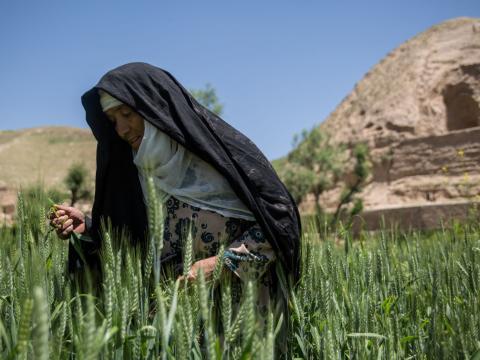After the drought, seed distributions help farmers get back on track

Tasa Gul is an exception in her village. While most of the women spend their time confined to their houses, tending to children and chores, she’s out in the fields, tending to her crops. But Tasa Gul doesn’t have an alternative. The fifly-year-old widow and mother of five has no extended family left to support her, so 14 years ago, when her husband passed, she decided to take matters into her own hands.
Over the years, Tasa was able to grow her produce, harvesting grains, onions, potatoes and tomatoes. With much of it used up for her family, she was able to sell small amounts in the bazaar, adding to her income.
“When I’m out in my fields, I’m the only female farmer. It’s a hard job, but it’s the only way for my children to go to school,” she explains.
But last year, with a severe drought affecting much of Afghanistan’s Badghis province, Tasa lost almost all of her crops. The little that remained was used up quickly, throwing the family into debt and desperation. Tasa had to stop farming for a while, substituting her income through tailoring jobs or asking her children to help bring home cash.
This year, she’s out again in the fields, with several hectares of green crops growing healthily in the sun. Her fields are nestled in between brown hills speckled with thin trees. While water is scarce, it has been enough to irrigate the fields.
Before the start of the planting season, World Vision with the support of the Food and Agriculture Organization, donated 50 kilograms of seeds to Tasa, including pesticides to keep pests and bugs away from the growing plants.
She was one of 200 families who was selected to receive assistance and training, working with the most vulnerable people across the province.
“I think this year will be easy,” she says while walking through her field and plugging weeds from in between the crops. She’s covered in a black chador - a dark sheet wrapped around her body. The sun is shining mercilessly, but it doesn’t keep Tasa from working hard.
“I’m doing it for my children,” she says. “Last year was difficult and I felt like, with no family around, I had no support. This season World Vision has been supporting me.”
She's not the only one. Her neighbour Shah Rahmat, a 55-year-old father of nine has equally received seeds and training. He sits in the shade of a tree in the midst his field, a black turban covering his head, as he recalls the last year. “It was a difficult one,” he says, admitting that he had to take some of his children out of school to help substitute the family’s income.

It wasn't an easy choice. Sheh had worked hard to afford an education for his children, but with much of his crops failing last year and water sources depleting, he didn’t see an alternative
“My children worked as daily labourers or helped sell goods in the bazaar,” he says sadly. “This year, I was finally able to send them back to school again.”
With no seeds left to plant in the coming season, Sheh was thankful to receive both seeds and training. His crops are growing quickly in the sunshine, letting him hope that this year will be a plentiful season.
“The rains have been good and we have enough water,” he explains. These days, he spends most of his time tending to the crops, only taking short rest in the shade with several of the other farmers. He barely leaves his village, a small community living in mud houses built on a hill, but complains that little services are available here.
“We have a school and enough land to farm, but there are no paved roads and no health facilities,” he says, hoping for the situation to improve in the coming years.
Sheh, who grew up in the same village, has been a farmer ever since he can remember. “I didn’t go to school but followed my dad’s example and started farming,” he remembers. “Some of my children might also farm, but I’m happy that they are getting an education.”
Sheh says that he’ll be able to save some of his growing seeds for the next season. “With the distribution, we’ve caught up to our losses,” he says, then gets up, throws a bit of water on his face to cool down, and continues his work in the field.